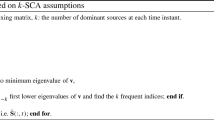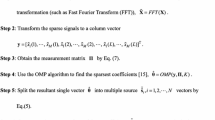Abstract
One (of) important application of sparse component analysis (SCA) is in underdetermined blind source separation (BSS). Within a probability framework, this paper focuses on recoverability problem of underdetermined BSS based on a two-stage SCA approach. We consider a general case in which both sources and mixing matrix are randomly drawn. First, we present a recoverability probability estimate under the condition that the nonzero entry number of a source column vector is fixed. Next, we define the sparsity degree of a signal, and establish the relationship between the sparsity degree of sources and recoverability probability. Finally, we explain how to use the relationship to guarantee the performance of BSS. Several simulation results have demonstrated the validity of the probability estimation approach.
Preview
Unable to display preview. Download preview PDF.
Similar content being viewed by others
References
Lewicki, M.S., Sejnowski, T.J.: Learning overcomplete representations. Neural Computation 12, 337–365 (2000)
Donoho, D.L., Elad, M.: Maximal sparsity representation via l1 minimization. The Proc. Nat. Aca. Sci. 100, 2197–2202 (2003)
Zibulevsky, M., Pearlmutter, B.A.: Blind Source Separation by Sparse Decomposition. Neural Computations 13, 863–882 (2001)
Lee, T.W., Lewicki, M.S., Girolami, M., Sejnowski, T.J.: Blind source separation of more sources than mixtures using overcomplete representations. IEEE Signal Processing Letter 6, 87–90 (1999)
Girolami, M.: A variational method for learning sparse and overcomplete representations. Neural Computation 13, 2517–2532 (2001)
Li, Y., Wang, J.: Sequential blind extraction of linearly mixed sources. IEEE Trans. on Signal Processing 50, 997–1007 (2002)
Li, Y.Q., Cichocki, A., Amari, S.: Analysis of Sparse representation and blind source separation. Neural Computation 16, 1193–1234 (2004)
Li, Y.Q., Cichocki, A., Amari, S., Ho, D.W.C., Xie, S.L.: Underdetermined blind source separation based on sparse representation. IEEE Trans. on Signal Processing (accepted)
Li, Y.Q., Amari, S., Cichocki, A., Guan, C.T.: Probability Estimation for Recoverability Analysis of Blind Source Separation Based on Sparse Representation. IEEE Trans. on Information Theory (revised) (submitted)
Author information
Authors and Affiliations
Editor information
Editors and Affiliations
Rights and permissions
Copyright information
© 2006 Springer-Verlag Berlin Heidelberg
About this paper
Cite this paper
Li, Y., Cichocki, A., Amari, Si., Guan, C. (2006). Analysis of Source Sparsity and Recoverability for SCA Based Blind Source Separation. In: Rosca, J., Erdogmus, D., Príncipe, J.C., Haykin, S. (eds) Independent Component Analysis and Blind Signal Separation. ICA 2006. Lecture Notes in Computer Science, vol 3889. Springer, Berlin, Heidelberg. https://doi.org/10.1007/11679363_103
Download citation
DOI: https://doi.org/10.1007/11679363_103
Publisher Name: Springer, Berlin, Heidelberg
Print ISBN: 978-3-540-32630-4
Online ISBN: 978-3-540-32631-1
eBook Packages: Computer ScienceComputer Science (R0)




